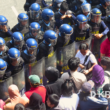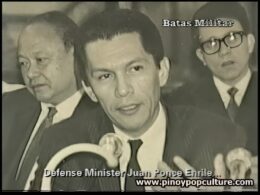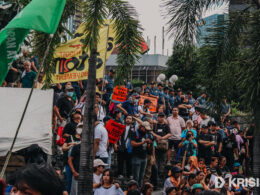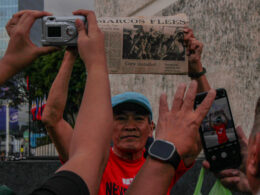We are once again at the top list.
The overwhelming victory of Manny Pacquiao as the greatest boxer in the world is overridden by another history maker just weeks after. Philippines beat Iraq as the most dangerous place for journalists in the world with 134 journalist killings—30 of such were the victims of the hideous Ampatuan massacre. No way can we be any proud of this record-breaking.
In 2004 alone, during the time of President Gloria Arroyo, there were 74 cases or more than half of the number of media killings recorded, according to the Philippine Center for Investigative Journalism.
However, the issue is far beyond the freedom of the press. The unabated culture of violence in Maguindanao and the government’s lack of appropriate action led to the mass murder that registered the world’s highest number of journalists slain in a day in one incident.
November 23, before the filing of candidacy by the wife of Esmael Mangudadatu, a local official in Shariff Aguak, Maguindanao, some 57 people including Mangudadatu’s wife and sisters, journalists, and two lawyers, were brutally killed. The women were raped— their heads and private organs, shattered with bullets.
Investigations point out to Andal Ampatuan, Jr. as the alleged mastermind of the mass murder. The Ampatuans, the longtime patriarch clan in Maguindanao, is a strong ally of President Gloria Arroyo, who in 2004, had a landslide victory over the late Fernando Poe, Jr.
It’s rather difficult neither to point fingers at the government nor to discount a premeditated angle to the murder, as the very presence of government-owned backhoes and pre-dug pits just four kilometers from where the convoy was stopped, is a bit too coincidental.
The rifles found in the crime scene were the same rifles the government has allotted to combat the Moro-Islamic Liberation Front, whom the Ampatuans claimed to be their hardest enemy.
There are things to learn from the massacre. Maguindanao, like in other places in Luzon and Visayas, are ruled by oligarch. This, being the root of the trouble, should not be tolerated.
Warlordism, a term first used during a chaos at the end of the Qing dynasty in China, occurs mostly in failed states where the central government and national authorities have no control over the state territory. It is often characterized by low bureaucratic control and a prolonged war for economic reasons.
With a separate power seemingly even higher than the state, the powerful Ampatuan clan perpetuates the culture of violence in Maguindanao. The government’s failure to address the long-term warlordism in Maguindanao is thus an insult to democracy.
Second, the government’s tacit approval, exploitation and tolerance of the culture of violence, worsens the peace conditions in Maguindanao.
Seeing armed men carrying firearms and paltiks in Maguindanao is commonplace. In fact, the culture of violence starts even at a young age, where children are normally drafted to be part of the private army.
Private armies even have blessings from Arroyo, who herself, have issued in July 2006 Executive Order 546— an order allowing local officials and the PNP to use barangay tanods as “force multipliers” in battling insurgencies.
Justified though as a means to combat the MILF in Mindanao, government-funded armies go against the 1987 Constitution entirely banning private armed groups. The private armies, disguised in a new name, then operate as armed, yet legal Civilian Volunteer Organizations (CVOs).
Third, Arroyo is in debt to the Ampatuans after giving her a landslide victory in 2004, that the government remains hands off and indecisive towards the incident.
In a previous interview of the Philippine Center for Investigative Journalism with Maguindanao provincial administrator Norie Unas, he affirmed the acceptance of people towards the fraudulent election and political system in Maguindanao. The stability of their political landscape, however, does not come from the people’s recognition of their authorities, as Unas claimed, but in the country’s culture of impunity—the government’s inability to assert its power and assume responsibility.
The boneless government we have manifests in its failure to demand and impose punishment on the perpetrators. Previously, Cerge Remonde asked Andal Ampatuan, Jr. to voluntarily surrender. As in the words of Conrado de Quiros, “paying for crime is not a matter of volition.”
The state has all the right to assert judgment and risk military action in crimes as gruesome as this one. No preferential treatment should be given to Andal Ampatuan, Jr. The system of corruption, violence, the fraud election system, and the men behind those, created the Ampatuans. The government has tolerated, if not created the pervading flaws in the system. It must, of course, know the way to shut off its creation.
Presently, Ampatuan, Jr. is under the custody of the National Bureau of Investigation.
We made it to the top list. The international communities’ eyes are now on us. While these deaths translate to great loss, it is also time for the government to stop the pervading cycle of violence. Start by dismantling private armies and holding the involved liable. Arroyo has gone so far on the coddling of monstrosities and scum of society that she, herself, has sunk to their likeness and level, perhaps, even lower.
Show some bones, Glory.
This article was retrieved from a Wayback Machine archive of UPJC’s old website on Feb. 7, 2010, 04:47:20 GMT.







